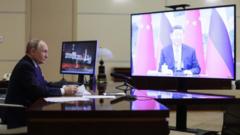In a video call lasting approximately one and a half hours, Chinese President Xi Jinping and Russian President Vladimir Putin reaffirmed their commitment to enhancing bilateral relations just hours after Donald Trump was inaugurated as President of the United States. According to state media reports, the leaders emphasized their friendship and mutual support, despite facing increasing external pressures.
During the conversation, which Putin referred to as an opportunity to build ties "on the basis of friendship, mutual trust and support," both leaders expressed a desire to elevate their cooperation to “greater heights.” Xi urged Putin to deepen their strategic coordination and bolster their mutual support, while also safeguarding their respective legitimate interests as they confront global challenges.
The dynamics of the conversation unfolded against a backdrop of geopolitical tension, particularly regarding the United States' stance toward both nations. Trump had expressed his intention to impose tariffs on China, labeling the country as an “abuser,” and warned of potential repercussions for Russia concerning its involvement in Ukraine. Notably, Putin countered that any resolution to the Ukraine conflict should respect "Russian interests," a viewpoint underscored by a growing economic partnership between China and Russia that reached a record trade volume of $240 billion in 2023.
Ushakov, a foreign affairs adviser to Putin, mentioned that both leaders were willing to engage with the U.S. based on mutual benefit and respect, contingent upon interest from Trump’s administration. Yet he noted that the call was not prompted by Trump’s inauguration, highlighting an ongoing agenda outside of U.S.-related issues.
The conversation also encompassed discussions on other geopolitical hotspots, including the Middle East, the situation in South Korea, and tensions surrounding Taiwan. Xi's earlier phone call with Trump had touched on trade matters, fentanyl, and the social media platform TikTok, reflecting the multifaceted nature of contemporary U.S.-China relations.
As Trump navigates his new role, the actions and strategies of Xi and Putin showcase a united front that may reshape international relations, as both countries seek to solidify their partnership amidst increasing scrutiny and evolving global power dynamics.
During the conversation, which Putin referred to as an opportunity to build ties "on the basis of friendship, mutual trust and support," both leaders expressed a desire to elevate their cooperation to “greater heights.” Xi urged Putin to deepen their strategic coordination and bolster their mutual support, while also safeguarding their respective legitimate interests as they confront global challenges.
The dynamics of the conversation unfolded against a backdrop of geopolitical tension, particularly regarding the United States' stance toward both nations. Trump had expressed his intention to impose tariffs on China, labeling the country as an “abuser,” and warned of potential repercussions for Russia concerning its involvement in Ukraine. Notably, Putin countered that any resolution to the Ukraine conflict should respect "Russian interests," a viewpoint underscored by a growing economic partnership between China and Russia that reached a record trade volume of $240 billion in 2023.
Ushakov, a foreign affairs adviser to Putin, mentioned that both leaders were willing to engage with the U.S. based on mutual benefit and respect, contingent upon interest from Trump’s administration. Yet he noted that the call was not prompted by Trump’s inauguration, highlighting an ongoing agenda outside of U.S.-related issues.
The conversation also encompassed discussions on other geopolitical hotspots, including the Middle East, the situation in South Korea, and tensions surrounding Taiwan. Xi's earlier phone call with Trump had touched on trade matters, fentanyl, and the social media platform TikTok, reflecting the multifaceted nature of contemporary U.S.-China relations.
As Trump navigates his new role, the actions and strategies of Xi and Putin showcase a united front that may reshape international relations, as both countries seek to solidify their partnership amidst increasing scrutiny and evolving global power dynamics.






















